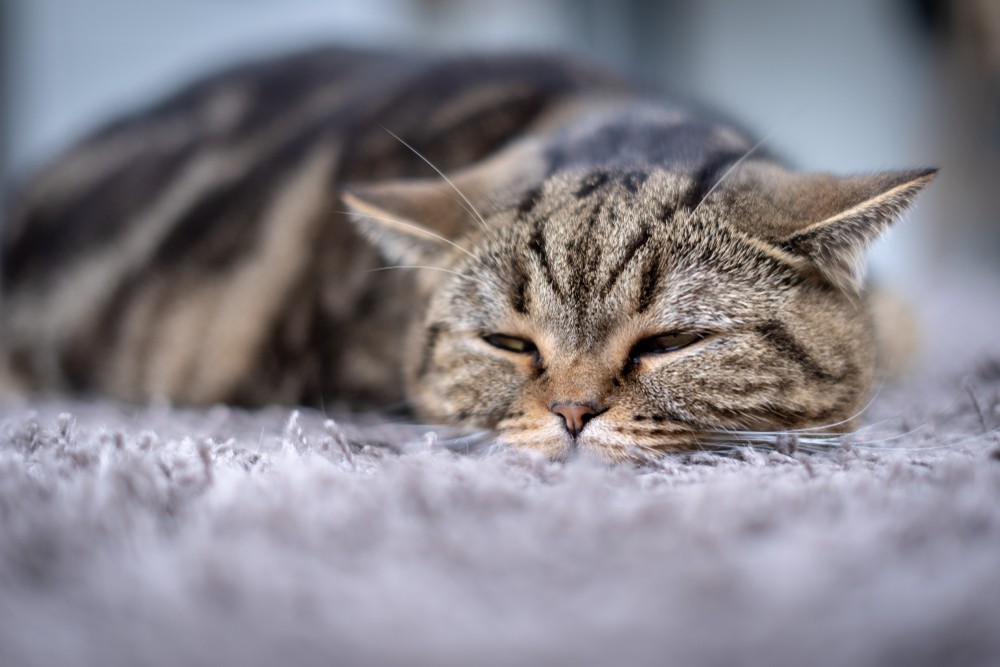Many cat owners enjoy watching their feline friends eat, groom, and engage in other endearing cat behaviors. Feeding time can be a special bonding experience, especially when you provide your cat with nutritious food. But have you ever wondered, “How Long Does It Take A Cat To Digest Food?” Understanding the feline digestive process can help you better care for your pet and recognize potential health issues.
Generally, it takes a cat’s body approximately 26 to 35 hours to fully process food. However, the actual digestion time, which is the time it takes for food to be broken down and nutrients absorbed, is a shorter segment of this total transit time.
The Feline Digestive System: A Detailed Overview
To understand the digestion timeline, let’s explore the key components of a cat’s digestive system:
- Mouth: Digestion starts here, where food is ingested. Unlike humans, cats have limited chewing ability as their jaws primarily move up and down.
- Esophagus: This muscular tube transports food from the mouth to the stomach.
- Stomach: A single-compartment organ where food is further broken down by acids. Food typically spends 1-3 hours in the stomach. Liquids pass through faster than solids.
- Liver: This accessory organ produces bile, which is stored in the gallbladder.
- Gallbladder: Releases bile to break down fats for easier digestion.
- Pancreas: Secretes enzymes to neutralize stomach acids and further break down food. The pancreas also produces insulin and glucagon for glucose regulation.
- Small Intestine: The longest part of the digestive system, where most nutrient absorption occurs.
- Large Intestine (Colon): Primarily responsible for reabsorbing water and forming feces.
The Digestive Process Step-by-Step
- Ingestion: Cats use their mouths to take in food.
- Mechanical Processing: Limited chewing occurs, with cats swallowing larger chunks of food.
- Digestion: Saliva mixes with food, though cats have minimal salivary amylase, an enzyme important for breaking down carbohydrates in many other species.
- Stomach Action: The stomach breaks down food using acids, turning it into a liquid consistency.
- Small Intestine’s Role: Bile from the gallbladder and enzymes from the pancreas aid in breaking down food into simpler nutrients, which are then absorbed in the small intestine.
- Large Intestine’s Function: Water is reabsorbed, forming feces.
- Elimination: Feces are stored until they are ready to be eliminated.
Factors Influencing Digestion Time
Several factors can affect how long it takes for a cat to digest food:
- Diet Composition: Cats are obligate carnivores, requiring a high-protein, animal-based diet. High-quality protein sources are more easily digested.
- Food Type: Wet food is often easier to digest than dry kibble due to its higher moisture content.
- Age: While not drastically different, kittens might digest food slightly faster than older cats due to their higher metabolic rate.
- Individual Metabolism: Each cat’s digestive system operates at a slightly different pace.
- Health Conditions: Underlying health issues can significantly impact digestion.
Promoting a Healthy Digestive System in Cats
A healthy digestive system is crucial for your cat’s overall well-being. Here are some tips to keep it functioning optimally:
- Feed a High-Quality Diet: Choose cat food formulated with high animal protein content, appropriate fat levels, and minimal carbohydrates.
- Consider Wet Food: Incorporating wet food into your cat’s diet can aid digestion and hydration.
- Ensure Fresh Water: Provide access to fresh, clean water at all times to support proper hydration and digestion.
- Monitor Litter Box Habits: Pay attention to the frequency and consistency of your cat’s stools. Changes can indicate digestive issues.
- Regular Vet Checkups: Schedule regular checkups with your veterinarian to monitor your cat’s overall health and address any potential digestive problems early.
 Cat Eating
Cat Eating
Common Digestive Issues in Cats
Recognizing signs of digestive distress is important for ensuring your cat receives timely care. Here are some common digestive issues to watch out for:
-
Constipation: Difficulty passing stools. A cat that hasn’t pooped in over 48 hours should be evaluated by a veterinarian.
- Causes: Pain, stress, dehydration, insufficient moisture in the diet, nervous system issues, kidney problems, hairballs, allergies, and chronic diseases.
-
Intestinal Blockage: Occurs when a cat ingests indigestible objects like string, plastic, or small toys.
- Symptoms: Vomiting, dehydration, weight loss, diarrhea, and refusing to eat. This requires immediate veterinary attention.
-
Inflammatory Bowel Disease (IBD): Characterized by chronic inflammation of the digestive tract.
- Symptoms: Vomiting, diarrhea, weight loss, and lack of appetite. Diagnosis often requires a biopsy.
- Causes: Immune dysfunction, food allergies, bacterial overgrowth, stress, genetics, and parasites.
-
Food Allergies: Allergic reactions to certain food ingredients.
- Symptoms: Skin lesions, itchiness, vomiting, diarrhea, and, in rare cases, respiratory issues. Diagnosis can involve blood tests, skin tests, and trial diets prescribed by a veterinarian.
Conclusion
Understanding “how long does it take a cat to digest food” and the complexities of the feline digestive system empowers you to make informed decisions about your cat’s diet and health. Remember that it generally takes between 26 to 35 hours for food to fully pass through a cat’s system, with the active digestion phase occurring primarily in the stomach and small intestine. Monitoring your cat’s eating habits and stool patterns, providing a high-quality diet, and seeking veterinary care when needed are essential for maintaining a healthy and happy feline companion.